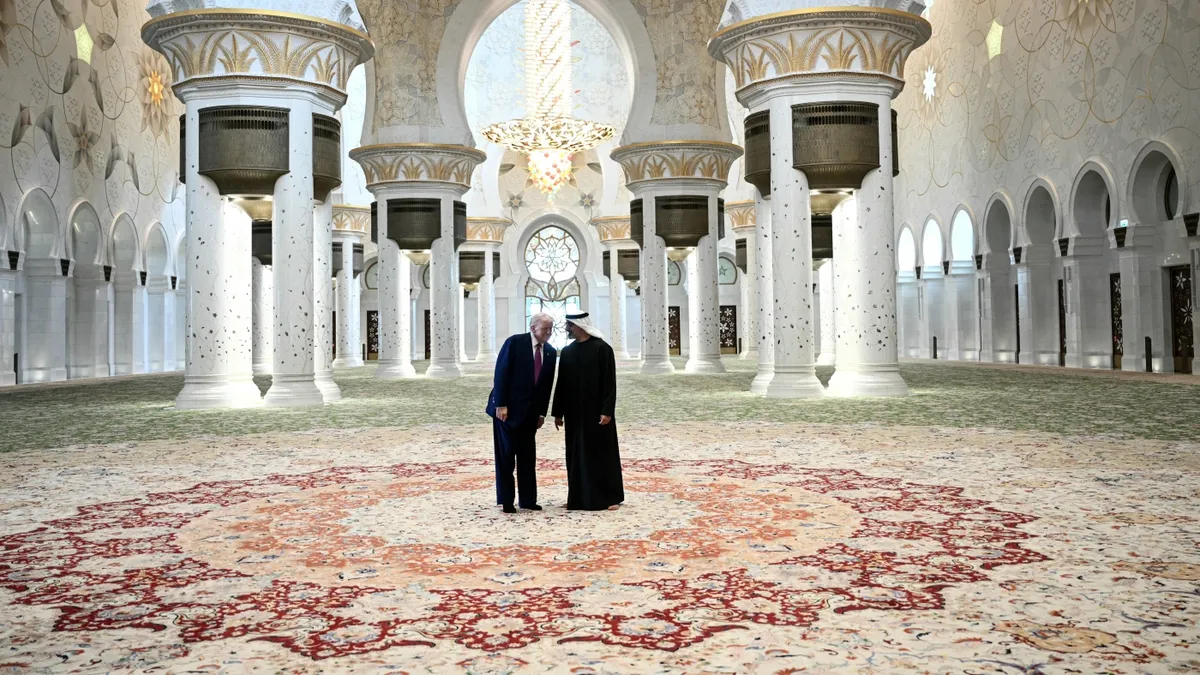
On Thursday, President Trump made a significant appearance at the Sheikh Zayed Grand Mosque in Abu Dhabi, marking his first publicly acknowledged visit to a Muslim house of worship during his presidency. This visit is part of a broader diplomatic tour across the Middle East, representing the first major foreign trip of his second term in office.
During his visit, Trump adhered to traditional mosque etiquette by removing his shoes, a gesture of respect observed in places of Islamic worship. Accompanied by Sheikh Khalid bin Mohammed Al Nahyan, the crown prince of Abu Dhabi, Trump expressed his admiration for the mosque, stating, “Isn't this beautiful? It is so beautiful. This is an incredible culture.” The mosque is renowned for its stunning white marble domes and Italian marble floors adorned with colorful floral inlays, making it a popular cultural destination for tourists, politicians, and celebrities visiting Abu Dhabi.
Trump's visit to the UAE represents the third leg of his Middle East tour, which began with grand ceremonies in Saudi Arabia and Qatar. In these countries, Trump received ceremonial welcomes featuring Arabian horses and honor guards. His relationship with Sheikh Mohammed bin Zayed, the ruler of the UAE, has been notably close, largely due to the UAE's historic decision to normalize relations with Israel during Trump's first term.
Trump's engagement in the Middle East is underscored by his extensive family business interests, including the development of Trump-branded towers and golf courses. Notably, a UAE fund utilized the Trump family’s cryptocurrency venture, World Liberty Financial, to finalize a substantial $2 billion investment in the crypto exchange Binance.
Trump's visit follows that of his daughter, Ivanka Trump, and her husband, Jared Kushner, who toured the mosque in 2020 during his first term as administration officials. Former Vice President Joe Biden also visited the mosque in 2016. It's worth noting that Trump has not visited any mosques in the United States during his presidency, and while it’s possible he may have attended a mosque privately, this has not been confirmed.
While many U.S. presidents have visited churches, only a few have made official visits to mosques. Historical precedents include President Dwight Eisenhower, who opened a mosque in Washington, D.C., in 1957, and former President George W. Bush, who spoke at the same mosque in 2001 following the September 11 attacks. In 2016, former President Barack Obama visited a mosque near Baltimore, highlighting the significance of these visits in fostering interfaith dialogue.
During his 2016 campaign, Trump controversially suggested that hateful ideas originate from mosques and implied the need for surveillance of these places of worship. Upon taking office, he enacted a travel ban targeting several Muslim-majority countries. However, he has since moderated his stance. During the recent election, Arab and Muslim voters played a crucial role in securing the key swing state of Michigan for Trump, even as many expressed disappointment with the Biden-Harris administration's steadfast support for Israel amid the ongoing conflict in Gaza.
In recent comments, Trump reassured the Muslim community, stating, “The Muslim community was there for us in November. And while I'm president, I will be there for you.” However, his relationship with Muslim voters has become increasingly strained since his inauguration. The ceasefire in the Israel-Hamas conflict, brokered in the final days of the Biden administration, has since collapsed, exacerbating the humanitarian crisis in Gaza, where residents have faced significant hardships due to an Israeli blockade.
As his trip continues, Trump has reignited discussions around the contentious idea of the United States taking control of the Gaza Strip, a notion that has met with resistance from Arab leaders. “I'd be proud to have the United States have it, take it, make it a freedom zone, let some good things happen,” he remarked, reflecting his unconventional approach to international relations.
President Trump is expected to conclude his Middle East tour on Friday, leaving a complex legacy of diplomatic engagement in a region marked by both opportunity and significant challenges.